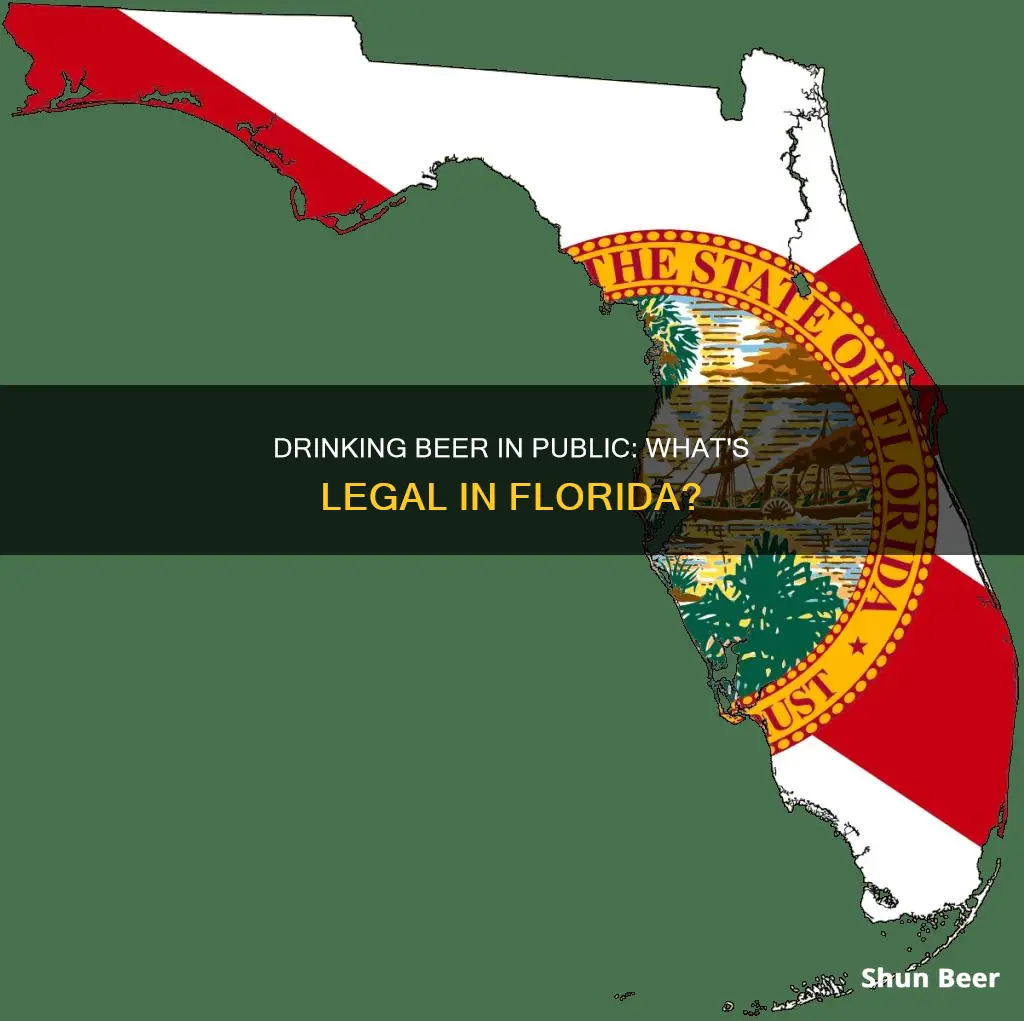
Florida's open container laws prohibit drinking beer or any alcoholic beverage in public places, including parks, beaches, streets, and vehicles. However, there are some exceptions to these rules, such as designated areas on certain beaches and specific conditions in select locations like the Riverwalk area in Tampa. While drinking in public is generally illegal, some cities like Key West and specific events like Gasparilla may turn a blind eye, creating a grey area in enforcement. Understanding local ordinances and regulations is essential to abide by the law, as penalties for public drinking can include fines or even jail time for repeat or severe offences.
What You'll Learn

Drinking in public places is generally prohibited in Florida
However, there are some exceptions to these rules. For instance, in certain designated areas within specific beaches, alcohol consumption is allowed. These include Cocoa Beach, Lido Key, Madeira Beach, Redington Beach, Siesta Key, St. Petersburg Beach, and Treasure Island. It's important to note that even on these beaches, there may be restrictions on drinking during certain hours or days, and open container laws may still apply, requiring alcohol to be in a specific type of container (usually non-glass).
Additionally, in some cities, like Tampa and Key West, there are areas where drinking in public may be tolerated to some extent, although it is still technically illegal. In Tampa, for example, alcoholic beverages are permitted on the Riverwalk between the Tampa Bay History Center and Water Works Park, as long as they are purchased from designated establishments, limited to two drinks, served in plastic cups with the Riverwalk logo, and consumed between 11 a.m. and 1 a.m.
Furthermore, Florida's open container law does have some specific exceptions. For instance, passengers in commercial vehicles like tour buses or in self-contained motorhomes over 21 feet in length are allowed to consume alcoholic beverages. Additionally, if you purchase a bottle of wine at a restaurant, you can transport it in your vehicle as long as it is resealed, placed in a secured bag or container with a dated receipt, and stored in a locked glove compartment or the trunk.
Canoeing and Beer: What's the Legal Verdict?
You may want to see also

Drinking in a parked car is illegal
Drinking in public in Florida is generally prohibited. This includes drinking alcohol in parks, beaches, streets, or any other public places. However, there are exceptions, with certain beaches having designated drinking areas.
Florida's open container law also applies to drinking in a parked car. According to Florida Statute 316.1936, it is against the law to possess or consume alcoholic beverages while in a motor vehicle, even if it is parked. This means that even if your vehicle is stationary, having an open alcoholic drink in the main cabin is illegal. The only exceptions to this rule are if you are a passenger in a commercial vehicle, such as a bus or taxi, or if you are in a self-contained motorhome that is at least 21 feet in length.
If you are found to be in violation of the open container law in Florida, you may face penalties. As a driver, possessing an open container is considered a noncriminal moving traffic violation, punishable by a fine of up to $100 for a first offense. Passengers may also be fined, typically a little less than the driver. If you are caught drinking in a parked car, you may be subject to these fines and other consequences, such as higher insurance premiums or a suspended license.
It is important to note that local ordinances and laws may vary, so it is always a good idea to check the specific rules and regulations of the area you are in.
Morning Beer: Should You Drink Before Work?
You may want to see also

Drinking on some beaches is allowed
Drinking in public places in Florida is generally prohibited. However, there are exceptions, with certain beaches permitting alcohol consumption in designated areas.
If you're looking to enjoy a drink on the beach, there are a few things to keep in mind. Firstly, check the specific rules and regulations of the beach you plan to visit, as each beach may have its own set of guidelines. Some beaches may restrict drinking during certain hours or on specific days, so it's important to be aware of any limitations before you go. Additionally, open container laws may apply, meaning alcohol must be in a specific type of container, such as plastic cups or bottles rather than glass.
Cocoa Beach
Just south of Cape Canaveral and the Kennedy Space Center, Cocoa Beach is considered one of the best hangout beaches in Florida. While glass bottles are prohibited, you can legally enjoy a drink along the shoreline if it's in a plastic container.
Jensen Beach
This Martin County beach is open 24/7, and beachgoers are permitted to drink alcohol on the sand. Martin County is the only county on the Treasure Coast where drinking is allowed, despite a proposed alcohol ban in 2016.
Treasure Island
Alcohol is permitted on Treasure Island Beach, but with significant restrictions. Beachgoers can only drink alcohol from 6 p.m. to 1 a.m. and from 5 a.m. to 8 a.m. Outside of these hours, alcohol consumption is prohibited.
St. Petersburg Beach
St. Petersburg Beach allows alcohol consumption, but only for registered guests of the city's beachfront hotels who are drinking within a rented cabana. Several hotels in the area, including the Dolphin Beach Resort and the Grand Plaza Hotel Beachfront Resort, offer this amenity to their guests.
Redington Beach
Redington Beach is unique in the area for permitting alcohol consumption, although glass bottles are prohibited. After a day at the beach, visitors can choose from a variety of nearby dining options, such as The Conch Republic Grill and Sweet Sage Cafe.
Siesta Key
Siesta Key, known for its quartz sand and clear waters, permits alcohol consumption as long as it's not in glass bottles. This popular vacation destination attracts around 350,000 tourists each year.
While drinking on these beaches is allowed, it's important to remember to always drink responsibly and follow the specific rules and regulations of each location. Additionally, keep in mind that public drinking offenses in Florida can result in fines or even jail time for severe or repeated offenses, so be sure to check local laws before consuming alcohol in public.
Drinking Beer at Dollywood: What You Need to Know
You may want to see also

Drinking in a vehicle with a commercial driver's license is permitted
Drinking in public is generally prohibited in Florida. However, there are some exceptions to this rule. For instance, alcoholic beverages can be consumed in certain designated areas, such as the Riverwalk area in Tampa, as long as specific conditions are met. These conditions include purchasing alcohol from designated establishments, limiting drinks to two per person, using plastic cups with the Riverwalk logo, and consuming drinks between 11 a.m. and 1 a.m.
Additionally, Florida's open container law, outlined in Florida Statute 316.1936, defines an open container as "any container of alcoholic beverage which is immediately capable of being consumed from, or the seal of which has been broken." This law applies to both drivers and passengers of a vehicle and prohibits the possession or consumption of alcoholic beverages while the vehicle is being operated or parked on a public street. However, there are exceptions to this law for passengers of commercial vehicles and self-contained motorhomes.
Passengers of commercial vehicles, such as tour buses or taxis, with a licensed commercial driver are permitted to possess and consume alcoholic beverages. This is because the open container law does not apply to vehicles for hire, such as taxis, buses, or limousines. It is important to note that ride-sharing services like Uber and Lyft do not fall under this exception, as their drivers typically do not possess a commercial driver's license.
For passengers of self-contained motorhomes that are at least 21 feet in length, consuming alcoholic beverages within the living quarters of the vehicle is allowed. However, the driver of the motorhome is still prohibited from accessing or consuming alcohol while operating the vehicle.
While Florida's open container law restricts drinking in vehicles, there are specific circumstances under which drinking in a vehicle with a commercial driver's license is permitted. These exceptions apply to passengers of commercial vehicles, such as tour buses or taxis, and passengers of self-contained motorhomes meeting certain size requirements.
Beer and Injections: What's Safe to Drink?
You may want to see also

Drinking in a self-contained motorhome over 21 feet in length is allowed
Florida's open container law prohibits possessing open alcoholic beverages in public spaces, including streets, parks, and beaches. However, there are exceptions to this rule, and drinking in public is permitted in certain areas.
While drinking in public is generally prohibited in Florida, there are specific locations where it is allowed. For example, in Tampa, you can have an open alcoholic drink in public in a designated area on the Riverwalk, as long as you purchase the drink from a designated establishment, have no more than two drinks, and use plastic cups with the Riverwalk logo between 11 a.m. and 1 a.m.
Additionally, there are several beaches in Florida where drinking alcohol is permitted, including:
- Cocoa Beach
- Jensen Beach
- Treasure Island
- Bathtub Reef Beach
- Siesta Key
- St. Petersburg Beach
- Redington Beach
- Vanderbilt Beach
- Flagler Beach
- Hobe Sound Beach
- Stuart Beach
- Lido Key
- Panama City Beach
- Perdido Key
- Madeira Beach
- Turtle Beach
- Naples Municipal Beach
However, it is important to note that some of these beaches have specific regulations, such as only allowing alcohol during certain hours or prohibiting glass bottles.
Drinking Beer While Pregnant: How Much Is Too Much?
You may want to see also
Frequently asked questions
In Florida, the public consumption of alcohol is generally prohibited. This includes drinking alcohol in parks, beaches, streets, or any other public places.
Yes, certain beaches have designated areas where alcohol consumption is allowed. These include Cocoa Beach, Lido Key, Madeira Beach, Redington Beach, Siesta Key, St. Petersburg Beach, and Treasure Island.
The consequences of violating public drinking laws in Florida can be severe. If caught with an open container of alcohol or visibly intoxicated, you may be charged with a misdemeanor, resulting in a fine of up to $250. For repeated or severe offenses, you could even face up to 90 days in jail.
No, it is against the law to possess or consume alcoholic beverages in an open container while driving or riding as a passenger in a motor vehicle. This includes parked or stopped vehicles on public streets.







